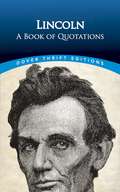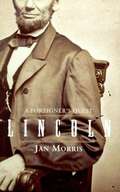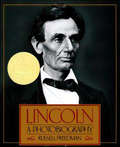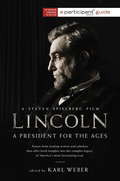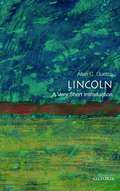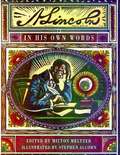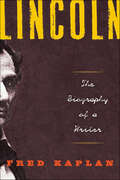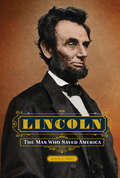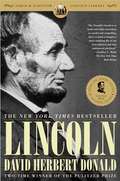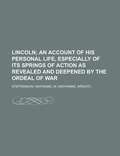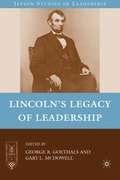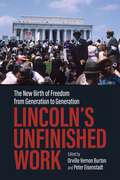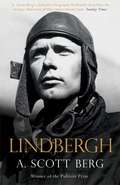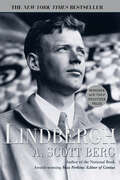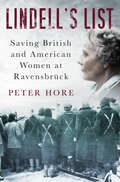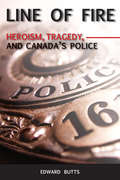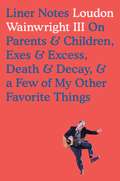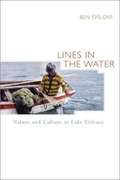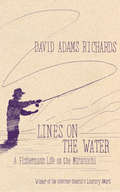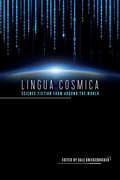- Table View
- List View
Lincoln: A Book Of Quotations (Dover Thrift Editions)
by Bob Blaisdell"All I have learned, I learned from books," declared Abraham Lincoln -- and this book offers ample learning from the sixteenth president's wise and often witty remarks. Drawn from speeches, letters, and other sources, these thoughts and opinions range from considerations of human nature and spirituality to the burdens and privileges of the presidency along with many other topics of enduring interest.Selections include comments on morality ("It has been my experience that folks who have no vices have very few virtues.") and the pursuit of happiness ("Folks are usually about as happy as they make their minds up to be.") as well as friendship ("I'm a success today because I had a friend who believed in me and I didn't have the heart to let him down."), human frailty ("It's not me who can't keep a secret. It's the people I tell that can't."), and other thought-provoking subjects.
Lincoln: A Foreigner's Quest
by Jan MorrisWith a fresh eye and inimitable style, the peerless travel and history writer Jan Morris journeys through the life of Abraham Lincoln to sketch an insightful new portrait of America's sixteenth president, one of our greatest and most enigmatic figures. Looking past his saintly image and log-cabin legend, Morris travels from Lincoln's birthplace to the White House to the infamous Ford Theater and conjures him in public and in private, as politician and as father, as commander-in-chief and as husband. With her skepticism and humor and marvelous sense of place, Morris seamlessly blends narrative, history, and biography to reveal the man behind the myth.
Lincoln: A Photobiography (Journeys 2014)
by Russell FreedmanThe Newbery Medal–winning book for young readers presents &“a human portrait of a politician honorably confronting the most vexing issues of his era&” (The New York Times Book Review). Abraham Lincoln stood out in a crowd as much for his wit and rollicking humor as for his height. This Newbery Medal-winning biography of our Civil War president is warm, appealing, and illustrated with dozens of carefully chosen photographs and prints. Russell Freedman begins with a lively account of Abraham Lincoln's boyhood, his career as a country lawyer, and his courtship and marriage to Mary Todd. Then the author focuses on Lincoln&’s presidency, skillfully explaining the many complex issues he grappled with as he led a deeply divided nation through the Civil War. The book's final chapter is a moving account of his tragic death at Ford's Theatre on April 14, 1865. The volume concludes with a sampling of Lincoln writings and a detailed list of Lincoln historical sites. "Few, if any, of the many books written for children about Lincoln can compare with Freedman's contribution…This is an outstanding example of what (juvenile) biography can be. Like Lincoln himself, it stands head and shoulders above its competition." —School Library Journal
Lincoln: A President for the Ages
by Karl Weber Participant MediaThe First American. Frontiersman and backwoods attorney. Teller of bawdy tales and a spellbinding orator. A champion of liberty some called a would-be tyrant. Savior of the Union and the Great Emancipator. All these are Abraham Lincoln-in his time America's most admired and reviled leader, and still our nation's most enigmatic and captivating hero. Timed to complement the new motion picture Lincoln, directed by Steven Spielberg, Lincoln: A President for the Ages introduces a new Lincoln grappling with some of history's greatest challenges. Would Lincoln have dropped the bomb on Hiroshima? How would he conduct the War on Terror? Would he favor women's suffrage or gay rights? Would today's Lincoln be a star on Facebook and Twitter? Would he embrace the religious right-or denounce it? The answers come from an all-star array of historians and scholars, including Jean Baker, Richard Carwardine, Dan Farber, Andrew Ferguson, Henry Louis Gates Jr. , Allen C. Guelzo, Harold Holzer, James Malanowski, James Tackach, Frank J. Williams, and Douglas L. Wilson. Lincoln also features actor/activist Gloria Reuben describing how she played Elizabeth Keckley, the former-slave-turned-confidante of First Lady Mary Todd Lincoln; and a selection of speeches and letters that explore little-known sides of Lincoln; "The Faces of Lincoln," exploring his complex contemporary legacy. Whether you're a lifetime admirer of Lincoln or newly intrigued by his story, Lincoln: A President for the Ages offers a fascinating glimpse of his many-sided legacy.
Lincoln: A Very Short Introduction
by Allen C. GuelzoBeneath the surface of the apparently untutored and deceptively frank Abraham Lincoln ran private tunnels of self-taught study, a restless philosophical curiosity, and a profound grasp of the fundamentals of democracy. Now, in Lincoln: A Very Short Introduction, the award-winning Lincoln authority Allen C. Guelzo offers a penetrating look into the mind of one of our greatest presidents. If Lincoln was famous for reading aloud from joke books, Guelzo shows that he also plunged deeply into the mainstream of nineteenth-century liberal democratic thought. Guelzo takes us on a wide-ranging exploration of seven problems that confronted Lincoln and liberal democracy--equality, opportunity, the rule of law, slavery, freedom, and reconciliation. The book sets these problems and Lincoln's responses against the larger world of American and trans-Atlantic liberal democracy in the 19th century, comparing Lincoln not just to Andrew Jackson or John Calhoun, but to British thinkers such as Richard Cobden, Jeremy Bentham, and John Bright, and to French observers Alexis de Tocqueville and Francois Guizot. The Lincoln we meet here is an Enlightenment figure who struggled to create a common ground between a people focused on individual rights and a society eager to establish a certain moral, philosophical, and intellectual bedrock. Lincoln insisted that liberal democracy had a higher purpose, which was the realization of a morally right political order. But how to interject that sense of moral order into a system that values personal self-satisfaction--"the pursuit of happiness"--remains a fundamental dilemma even today. Abraham Lincoln was a man who, according to his friend and biographer William Henry Herndon, "lived in the mind." Guelzo paints a marvelous portrait of this Lincoln--Lincoln the man of ideas--providing new insights into one of the giants of American history.
Lincoln: In His Own Words
by Milton MelzerCombines background commentary with quotes from Lincoln's letters, speeches, and public papers to provide a personal view of his life, thoughts, and actions.
Lincoln: The Biography of a Writer
by Fred Kaplan“A fine, invaluable book. . . . Certain to become essential to our understanding of the 16th president. . . . Kaplan meticulously analyzes how Lincoln’s steadily maturing prose style enabled him to come to grips with slavery and, as his own views evolved, to express his deepening opposition to it.” — Jonathan Yardley, The Washington Post Book WorldFor Abraham Lincoln, whether he was composing love letters, speeches, or legal arguments, words mattered. In Lincoln, acclaimed biographer Fred Kaplan explores the life of America's sixteenth president through his use of language both as a vehicle to express complex ideas and feelings and as an instrument of persuasion and empowerment.This unique and engrossing account of Lincoln's life and career highlights the shortcomings of the modern presidency, reminding us, through Lincoln's legacy and appreciation for language, that the careful and honest use of words is a necessity for successful democracy.
Lincoln: The Man Who Saved America (Illustrated Lives)
by David J KentA lively, illustrated biography of America’s 16th president from his humble beginnings to his historic leadership during the Civil War.Abraham Lincoln was, to put it mildly, an unlikely candidate for president. Raised on the frontier and mostly self-taught, the gangly farmer had little in common with the Founding Fathers, with one exception: a deep and abiding belief in America’s still-fragile experiment in democracy. Turning his quick mind and gregarious personality to politics, Lincoln ascended through state and national government, before being elected president in 1860 on the eve of the Civil War. During that bloody and devastating conflict, Lincoln’s tenacity, strategic brilliance, and plain-spoken eloquence not only helped keep the nation together through its darkest hours but also set the course for a reconciliation that he would not live to see. Filled with historical drama and packed with rare illustrations, Lincoln: The Man Who Saved America weaves the fascinating biography of Abraham Lincoln into the story of the most perilous period in American history.
Lincoln: Two Glimpses Of Abraham Lincoln's Family Life
by David Herbert DonaldDavid Herbert Donald's Lincoln is a stunningly original portrait of Lincoln's life and presidency. Donald brilliantly depicts Lincoln's gradual ascent from humble beginnings in rural Kentucky to the ever- expanding political circles in Illinois, and finally to the presidency of a country divided by civil war. Donald goes beyond biography, illuminating the gradual development of Lincoln's character, chronicling his tremendous capacity for evolution and growth, thus illustrating what made it possible for a man so inexperienced and so unprepared for the presidency to become a great moral leader. In the most troubled of times, here was a man who led the country out of slavery and preserved a shattered Union -- in short, one of the greatest presidents this country has ever seen.
Lincolnomics: How President Lincoln Constructed the Great American Economy
by John F. WasikA biography of Abraham Lincoln that examines his untold legacy as the Great Builder of American infrastructure. Abraham Lincoln&’s view of the right to fulfill one&’s economic destiny was at the core of his governing philosophy―but he knew no one could climb that ladder without strong federal support. Some of his most enduring policies came to him before the Civil War, visions of a country linked by railroads running ocean to ocean, canals turning small towns into bustling cities, public works bridging farmers to market. Expertly appraising the foundational ideas and policies on infrastructure that America&’s sixteenth president rooted in society, John F. Wasik tracks Lincoln from his time in the 1830s as a young Illinois state legislator pushing internal improvements; through his work as a lawyer representing the Illinois Central Railroad in the 1840s; to his presidential fight for the Transcontinental Railroad; and his support of land-grant colleges that educated a nation. To Lincoln, infrastructure meant more than the roads, bridges, and canals he shepherded as a lawyer and a public servant. These brick-and-mortar developments were essential to a nation&’s lifting citizens above poverty and its isolating origins. Lincolnomics revives the disremembered history of how Lincoln paved the way for Eisenhower&’s interstate highways and FDR&’s social amenities. With an afterword addressing the failure of American infrastructure during the COVID-19 pandemic, and how Lincoln&’s policies provide a guide to the future, Lincolnomics makes the case for the man nicknamed &“The Rail Splitter&” as the Presidency&’s greatest builder. &“In this unique blend of biography and policy prescription, journalist Wasik . . . casts Abraham Lincoln as America&’s &“foremost moral architect of economic and social opportunity&” and looks to his life and political career for lessons in how the nation might rebuild its infrastructure and redress income inequality. . . . Wasik convincingly argues that [Lincoln&’s] economic policies deserve more credit.&” —Publishers Weekly &“While revealing as history, Wasik&’s account about the first Republican President&’s launches of infrastructure shame the ignorant, obstinate, narcissist Republicans of today who wish instead to build up tyrant Trump&’s political infrastructure. This is a book to be read and used today.&” —Ralph Nader &“Wasik invented a new word for this book because his theme bears new force: Abraham Lincoln sought a better-built nation and a freer legal space to help every individual, regardless of background, to aspire and rise. Most historians know this too vaguely about Lincoln; Wasik finally gives the great democratic idea the prominence it deserves.&” —James M. Cornelius, Ph.D., editor, Journal of the Abraham Lincoln Association
Lincoln’s Legacy of Leadership
by Gary L. Mcdowell George R. GoethalsAn in-depth look at Abraham Lincoln's leadership, both before and during his presidency. Lincoln led through times of confusion, war, and dissent. The set of chapters included in this volume are based on papers that constituted part of the 2008-2009 Jepson Leadership Forum at the Jepson School of Leadership Studies at the University of Richmond.
Lincoln’s Unfinished Work: The New Birth of Freedom from Generation to Generation
by Eric Foner Richard Carwardine Mark Schultz Jerald Podair Gavin Wright Stephen Kantrowitz William Haller J. William Harris Randall Stephens Joshua Casmir Catalano Greg Downs James Loewen Lawrence McDonnell Adrienne Petty Briana Pocratsky Rhondda ThomasIn his Gettysburg Address, Abraham Lincoln promised that the nation’s sacrifices during the Civil War would lead to a “new birth of freedom.” Lincoln’s Unfinished Work analyzes how the United States has attempted to realize—or subvert—that promise over the past century and a half. The volume is not solely about Lincoln, or the immediate unfinished work of Reconstruction, or the broader unfinished work of America coming to terms with its tangled history of race; it investigates all three topics.The book opens with an essay by Richard Carwardine, who explores Lincoln’s distinctive sense of humor. Later in the volume, Stephen Kantrowitz examines the limitations of Lincoln’s Native American policy, while James W. Loewen discusses how textbooks regularly downplay the sixteenth president’s antislavery convictions. Lawrence T. McDonnell looks at the role of poor Blacks and whites in the disintegration of the Confederacy. Eric Foner provides an overview of the Constitution-shattering impact of the Civil War amendments. Essays by J. William Harris and Jerald Podair examine the fate of Lincoln’s ideas about land distribution to freedpeople. Gregory P. Downs focuses on the structural limitations that Republicans faced in their efforts to control racist violence during Reconstruction. Adrienne Petty and Mark Schultz argue that Black land ownership in the post-Reconstruction South persisted at surprisingly high rates. Rhondda Robinson Thomas examines the role of convict labor in the construction of Clemson University, the site of the conference from which this book evolved. Other essays look at events in the twentieth and twenty-first centuries. Randall J. Stephens analyzes the political conservatism of white evangelical Christianity. Peter Eisenstadt uses the career of Jackie Robinson to explore the meanings of integration. Joshua Casmir Catalano and Briana Pocratsky examine the debased state of public history on the airwaves, particularly as purveyed by the History Channel. Gavin Wright rounds out the volume with a striking political and economic analysis of the collapse of the Democratic Party in the South.Taken together, the essays in this volume offer a far-reaching, thought-provoking exploration of the unfinished work of democracy, particularly as it pertains to the legacy of slavery and white supremacy in America.
Lindbergh
by A. Scott BergFew American icons provoke more enduring fascination than Charles Lindbergh--renowned for his one-man transatlantic flight in 1927, remembered for the sorrow surrounding the kidnapping and death of his firstborn son in 1932, and reviled by many for his opposition to America's entry into World War II. Lindbergh's is "a dramatic and disturbing American story," says the Los Angeles Times Book Review, and this biography--the first to be written with unrestricted access to the Lindbergh archives and extensive interviews of his friends, colleagues, and close family members--is "the definitive account."
Lindell's List: Saving British and American Women at Ravensbrück
by Peter HoreAlready a decorated heroine of the First World War, British-born Mary Lindell, Comtesse de Milleville, was one of the most colourful and courageous agents of the Second World War, yet her story has almost been forgotten. Evoking the spirit of Edith Cavell, and taking the German occupation of Paris in 1940 as a personal affront, she led an escape line for patriotic Frenchmen and British soldiers. After imprisonment, escape to England, a secret return to France and another arrest, she began to witness the horrors of German-run prisons and concentration camps. In April 1945, a score of British and American women emerged from the Women’s Hell – Ravensbrück concentration camp – who had been kept alive by the willpower and the strength of one woman, Mary Lindell. She combined a passion for adventure with blunt speech and persistently displayed the greatest personal bravery in the face of great adversity. To counter German claims that they had no British or American prisoners, Mary smuggled out a plea for rescue and produced her list from her pinafore pocket, compiled in secret from the camp records. This vital list contained the names of captured women, many of whom were agents of British Military Intelligence, the Special Operations Executive or the French Resistance. Poignantly supported by first-hand testimony, Lindell’s List tells the moving story of Mary Lindell’s heroic leadership and the endurance of a group of women who defied the Nazis in the Second World War.
Lindy Chamberlain: The Full Story
by Ken CrispinThe true story of a mother accused of murdering her baby in the outback of Australia.
Line of Fire: Heroism, Tragedy, and Canada's Police
by Edward ButtsAcross Canada peace officers put their lives on the line every day. From John Fisk in 1804, the first known Canadian policeman killed in the line of duty, to the four RCMP officers shot to death in Mayerthorpe, Alberta, in 2005, renowned true crime writer Edward Butts takes a hard-hitting, compassionate, probing look at some of the stories involving the hundreds of Canadian law-enforcement officers who have found themselves in harm’s way. Some, like the four RCMP officers who perished in the Northwest Territories on the "Lost Patrol" of 1910, died in horrible accidents while performing their duties. Others, such as the Mounties involved in the manhunts for Almighty Voice and the Mad Trapper of Rat River, found themselves in extremely dangerous, violent situations. One thing is certain about all of these peace officers: they displayed amazing courage and never hesitated to make the ultimate sacrifice for their fellow citizens.
Liner Notes: On Parents & Children, Exes & Excess, Death & Decay, & a Few of My Other Favorite Things
by Loudon WainwrightLoudon Wainwright III, the son of esteemed Life magazine columnist Loudon Wainwright, Jr., is the patriarch of one of America’s great musical families. He is the former husband of Kate McGarrigle and Suzzy Roche, and father of Rufus Wainwright, Martha Wainwright, Lucy Wainwright Roche, and Lexie Kelly Wainwright. With a career spanning more than four decades, Wainwright has established himself as one of the most enduring singer-songwriters who emerged from the late 1960s. Not only does he perform regularly across America and in Europe, but he is a sought-after actor, having appeared in many movies and TV series. There is probably no singer-songwriter who has so blatantly inserted himself into his songs. The songs can be laugh-out-loud funny, but they also can cut to the bone. In this memoir, Wainwright details the family history his lyrics have referenced and the fractured relationships among generations: the alcoholism, the infidelities, the competitiveness—as well as the closeness, the successes, and the joy. Wainwright reflects on the experiences that have influenced his work, including boarding school, the music business, swimming, macrobiotics, sex, incarceration, and something he calls Sir Walter Raleigh Syndrome. Wainwright writes poignantly about being a son—a status that dominates many of his songs—but also about being a parent, a brother, and a grandfather. His lyrics are featured throughout the book, amplifying his prose and showing the connections between the songs and real life. Wainwright also includes selections from his father’s brilliant Life magazine columns—and, in so doing, reestablishes his father as a major essayist of his era. A funny and insightful meditation on family, inspiration, and art, Liner Notes will thrill fans, readers, and anyone who appreciates the intersection of music and life.
Lines for Living
by Mary KennedyWhen Mary Kennedy wrote Lines I Love a few years ago, it struck a chord in the hearts of Irish people across the country, quickly becoming a firm favourite with readers. In Lines for Living, Mary expands upon the themes from that bestselling book, once again sharing with us her inner world with a collection of stories and musings about life in all its hues and flavours. This volume is illustrated throughout with new, treasured quotes, of which she remains an avid collector - including some from the many readers who were inspired to write to her. The book weaves gently through the stages of life, covering such varying themes as motherhood and adjusting to the 'empty nest', age and beauty, the healing power of nature, home-making, food and celebrations, community, friendship, spirituality and gardening. Replete with the warmth, honesty and humour we have come to expect from one of Ireland's best-loved broadcasters, Lines for Living is the perfect gift to give or receive, a book to cherish and dip into time and again.
Lines for Living
by Mary KennedyWhen Mary Kennedy wrote Lines I Love a few years ago, it struck a chord in the hearts of Irish people across the country, quickly becoming a firm favourite with readers. In Lines for Living, Mary expands upon the themes from that bestselling book, once again sharing with us her inner world with a collection of stories and musings about life in all its hues and flavours. This volume is illustrated throughout with new, treasured quotes, of which she remains an avid collector - including some from the many readers who were inspired to write to her. The book weaves gently through the stages of life, covering such varying themes as motherhood and adjusting to the 'empty nest', age and beauty, the healing power of nature, home-making, food and celebrations, community, friendship, spirituality and gardening. Replete with the warmth, honesty and humour we have come to expect from one of Ireland's best-loved broadcasters, Lines for Living is the perfect gift to give or receive, a book to cherish and dip into time and again.
Lines in the Water: Nature and Culture at Lake Titicaca
by Benjamin S. OrlovePart ethnography, part natural history, part memoir, Ben Orlove's book reflects on the changes that have taken place over 30 years in the fishing villages along the shores of Lake Titicaca.
Lines of Descent
by Kwame Anthony AppiahW. E. B. Du Bois never felt so at home as when he was a student at the University of Berlin. But Du Bois was also American to his core, scarred but not crippled by the racial humiliations of his homeland. In Lines of Descent," Kwame Anthony Appiah traces the twin lineages of Du Bois' American experience and German apprenticeship, showing how they shaped the great African-American scholar's ideas of race and social identity. At Harvard, Du Bois studied with such luminaries as William James and George Santayana, scholars whose contributions were largely intellectual. But arriving in Berlin in 1892, Du Bois came under the tutelage of academics who were also public men. The economist Adolf Wagner had been an advisor to Otto von Bismarck. Heinrich von Treitschke, the historian, served in the Reichstag, and the economist Gustav von Schmoller was a member of the Prussian state council. These scholars united the rigorous study of history with political activism and represented a model of real-world engagement that would strongly influence Du Bois in the years to come. With its romantic notions of human brotherhood and self-realization, German culture held a potent allure for Du Bois. Germany, he said, was the first place white people had treated him as an equal. But the prevalence of anti-Semitism allowed Du Bois no illusions that the Kaiserreich" was free of racism. His challenge, says Appiah, was to take the best of German intellectual life without its parochialism--to steal the fire without getting burned.
Lines on the Water
by David Adams RichardsIn Lines on the Water, David Adams Richards writes eloquently and movingly about his life on the shores of one of the world's great fishing rivers. With the same insight and emotion that have won him praise for his fiction, Richards brings to life a community centred on fly-fishing -- a sport that has become, for many, a way of life. Weaving together tales of the guides and poachers, the "sports" and the city slickers, Richards pays tribute to all who have shared in the joy of fishing the Miramichi.This is a book about our relationship with nature, about hunters and fishermen, friendship and family, history and memory. Lines on the Water teems with lore and wisdom, humour, and most of all, passion.
Lingua Cosmica: Science Fiction from around the World
by Dale KnickerbockerAnthologies, awards, journals, and works in translation have sprung up to reflect science fiction's increasingly international scope. Yet scholars and students alike face a problem. Where does one begin to explore global SF in the absence of an established canon? Lingua Cosmica opens the door to some of the creators in the vanguard of international science fiction. Eleven experts offer innovative English-language scholarship on figures ranging from Cuban pioneer Daína Chaviano to Nigerian filmmaker Olatunde Osunsanmi to the Hugo Award-winning Chinese writer Liu Cixin. These essays invite readers to ponder the themes, formal elements, and unique cultural characteristics within the works of these irreplaceable—if too-little-known—artists. Dale Knickerbocker includes fantasists and genre-benders pushing SF along new evolutionary paths even as they draw on the traditions of their own literary cultures. Includes essays on Daína Chaviano (Cuba), Jacek Dukaj (Poland), Jean-Claude Dunyac (France), Andreas Eschbach (Germany), Angélica Gorodischer (Argentina), Sakyo Komatsu (Japan), Liu Cixin (China), Laurent McAllister (Yves Meynard and Jean-Louis Trudel, Francophone Canada), Olatunde Osunsanmi (Nigeria), Johanna Sinisalo (Finland), and Arkady and Boris Strugatsky (Russia). Contributors: Alexis Brooks de Vita, Pawel Frelik, Yvonne Howell, Yolanda Molina-Gavilán, Vibeke Rützou Petersen, Amy J. Ransom, Hanna-Riikka Roine, Hanna Samola, Mingwei Song, Tatsumi Takayuki, Juan Carlos Toledano Redondo, and Natacha Vas-Deyres.
